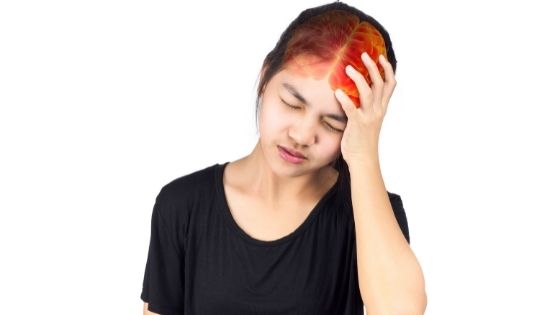Migraines affect females more than males. One reason behind this is the hormonal changes throughout life. The migraine attack in women is mostly triggered by menstruation. Menstrual migraine means migraine attacks related to menstruation. These migraines are very severe and have only a few responsive treatments. Usually, women experience migraines at other times also. But there are also some cases where women get migraines only at the time of menstruation. It is known as pure menstrual migraine.

What causes menstrual migraine?
Estrogen and progesterone are the main female sex hormones.
The hormone that is related to physical changes, puberty, and reproduction is estrogen. This hormone also affects the menstrual cycle, cholesterol, bone health, etc. Estrogen is also responsible for bone, skin, brain, and heart tissues. In females, the estrogen changes a lot. The estrogen level is maximum when you are in the middle of the cycle. The minimum level is when the female is on period. Estrogen levels drop to very low when the female is one menopause. Menstrual headaches are directly related to changes in estrogen levels. The level drops immediately before the menstrual flow. These migraines get improved during the pregnancy. But some females also face migraines in their first trimester.
What can trigger menstrual migraines?
The main cause behind menstrual migraine is the drop in estrogen level. However, various other factors can trigger menstrual migraine in women. Birth control pills can also cause menstrual migraines. Some women face menstrual migraine due to hormone replacement therapy. If you are getting menstrual migraines then you should take migraines treatment Pennsylvania. A proper treatment will help to reduce the pain and prevent a recurrence.
Common symptoms of menstrual migraine?
The symptoms of menstrual migraine are similar to the other migraines.
- Sensitivity to noise, smell, and light
- Loss of appetite
- Pale skin color
- Sweating or chills
- Throbbing headache
- Appetite loss
- Feeling tired
- Nausea and vomiting
- Abdominal pain
- Diarrhea
How to diagnose menstrual migraine?
Your doctor will advise you to create a journal about your migraine pain, symptoms, and triggers. You have to write about the pain location and its severity. Some people face pounding pain whereas some get throbbing or pulsing pain. Regularity of the pain and the factors which make the pain worse. You have to talk about your daily activities, diet, stress, etc. Also, check if anyone in your family is dealing with the same situation. You may also have to do some blood tests and imaging tests. These tests are necessary to ensure that you are not dealing with some other severe condition. Your journal will help you and the doctor to find out the symptoms and causes. Once your healthcare provider finds the cause, he will prescribe you the proper medication or treatment.
What are the medications for menstrual migraines?
NSAIDs are usually prescribed to ease menstrual migraines such as:
- Ibuprofen
- Ketoprofen
- Fenoprofen
- Naproxen
- Nabumetone, etc.
These NSAIDs must be taken before 2-3 days of periods and have to continue till the menstrual flow ends. Your doctor may also perceive the triptans that are used to treat acute migraines. Some common triptan medications for menstrual migraine are:
- Eletriptan
- Almotriptan
- Naratriptan
Frovatriptan, etc. Some pregnant females get menstrual migraines during the trimester. Taking these medications can affect the baby. Do not take any of these medications during pregnancy. Talk to your healthcare provider and he may prescribe you some mild pain reliever. Do not take any pain killer without consulting your doctor.
Some other medications that are also helpful to reduce menstrual migraine pain are:
- Small doses of ergotamine
- Beta-blocker drugs
- Anticonvulsants
- Caffeine
- Calcium channel blockers
- Contraceptives
- Analgesics
- Corticosteroids
You have started these medications 2 days before the period and continue till it ends.
Side effects of medications
There are a few side effects of taking menstrual migraines medications. These side-effects can differ depending on the person’s body. Common side-effects of this medication are:
- Dry other
- Headache
- Weakness
- Pressure in chest
- Dizziness
- Nausea
- Sleepiness
Treatment options for menopausal migraines
During menopause, the estrogen level gets very reduced. For this, you should start taking the lowest dose of estrogen supplements. Instead of taking these doses for a week, start taking them every day. Maintaining the estrogen level in the body helps in preventing headaches.
Natural medication
Taking lots of medications to ease menstrual migraines can cause other harm to the body. However, you can opt for a natural treatment for reducing menstrual migraines. These medications may not reduce the pain immediately but are very effective. Natural remedies do not cause any negative side effects to the body and fix the root cause behind the menstrual migraines. This type of treatment may require a few months but helps in preventing recurrence.
Food items to prevent menstrual migraine
Several food items can help you to reduce menstrual migraine. Your diet affects the pain a lot. Proper diet can ease the pain and promote wellness. Some food items to prevent menstrual migraines are fibrous fruits, vegetables, ginseng, flax, sesame, etc.
